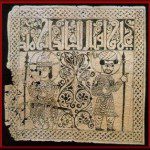Thousands of years before recorded human history, anthropologists have traced the evolution of human society from a nomadic hunter-gatherer phase to the rise of agricultural practices, which allowed people to stay settled in one place, form complex societies, and ultimately early civilizations. This transition, it is said, was so momentous that it has become known as the Agricultural Revolution. A few decades ago, however, a scholar posited that humans lost leisure time in the process, becoming virtual slaves to their new agricultural lifestyles that required hours of maintenance daily. This counterargument declared that the Agricultural Revolution was nothing less than the greatest disaster to ever befall mankind.
“Not so fast!,” says our guest this week. Rachel Laudan, a renowned food historian and author of Cuisine and Empire: Cooking in World History, argues that this thesis, which has found a champion in Jared Diamond’s best-selling Guns, Germs & Steel, fails to take food preparation into account. Our interview offers a different perspective and raises some new questions about the social impact of the beginnings of agriculture.



